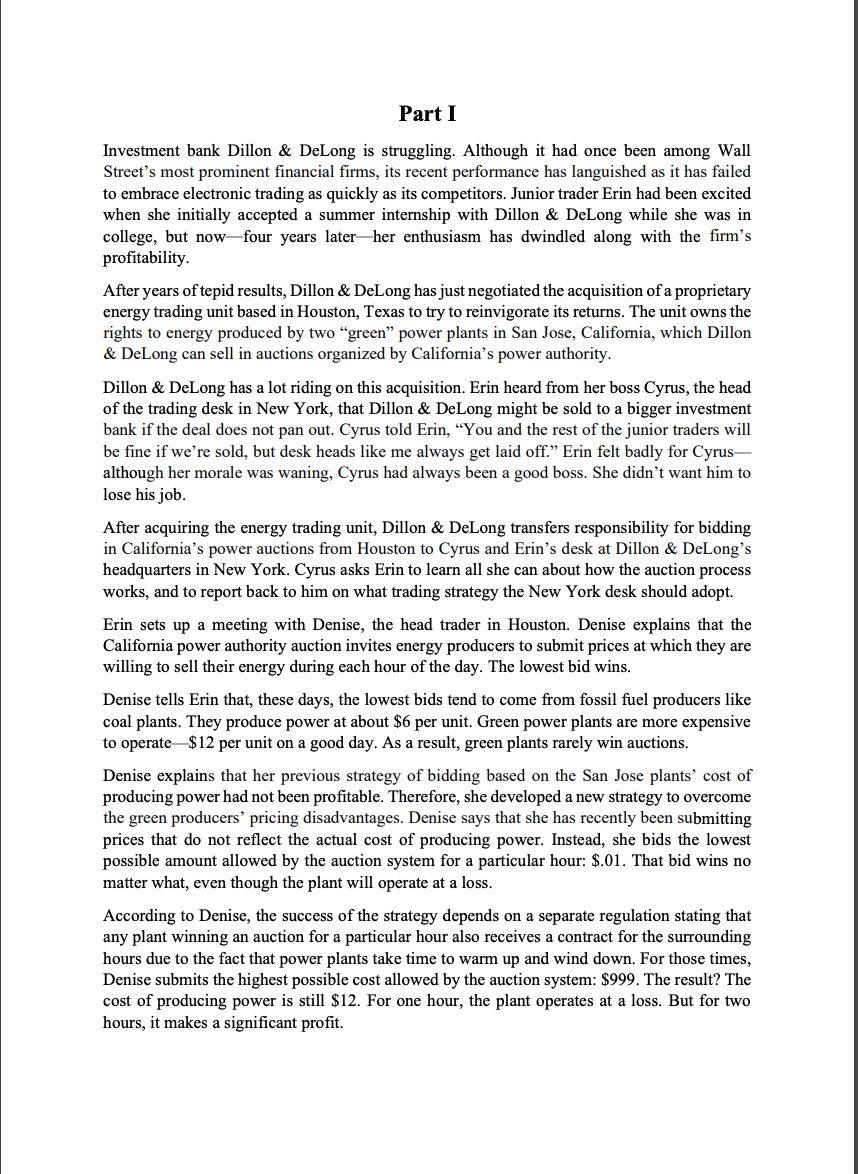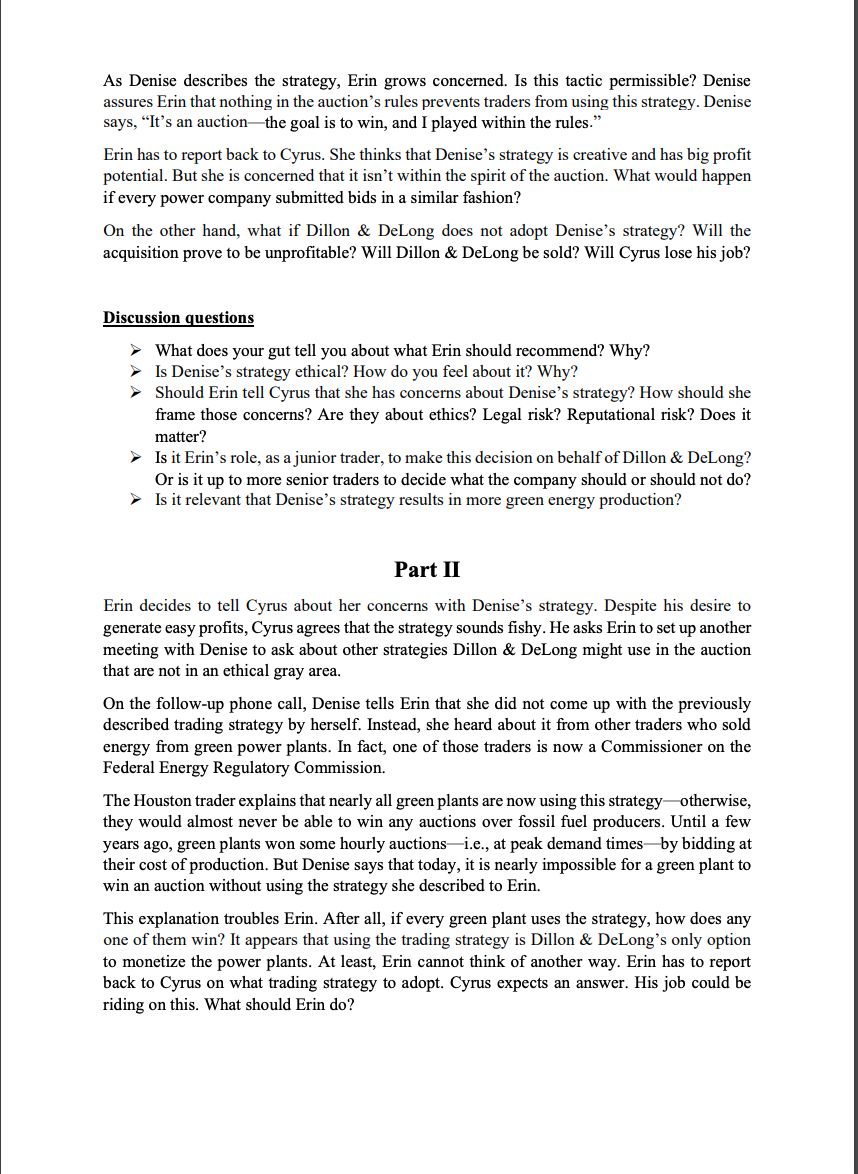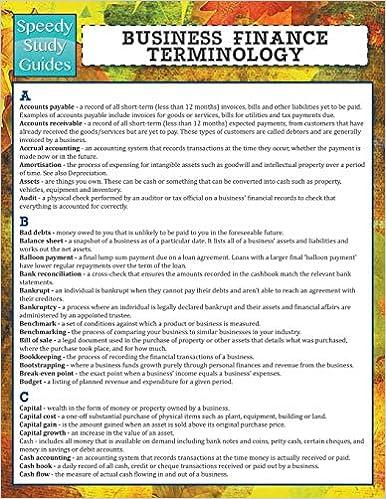


Part I Investment bank Dillon & DeLong is struggling. Although it had once been among Wall Street's most prominent financial firms, its recent performance has languished as it has failed to embrace electronic trading as quickly as its competitors. Junior trader Erin had been excited when she initially accepted a summer internship with Dillon & DeLong while she was in college, but now-four years later-her enthusiasm has dwindled along with the firm's profitability After years of tepid results, Dillon & DeLong has just negotiated the acquisition of a proprietary energy trading unit based in Houston, Texas to try to reinvigorate its returns. The unit owns the rights to energy produced by two "green" power plants in San Jose, California, which Dillon & DeLong can sell in auctions organized by California's power authority. Dillon & DeLong has a lot riding on this acquisition. Erin heard from her boss Cyrus, the head of the trading desk in New York, that Dillon & DeLong might be sold to a bigger investment bank if the deal does not pan out. Cyrus told Erin, You and the rest of the junior traders will be fine if we're sold, but desk heads like me always get laid off. Erin felt badly for Cyrus- although her morale was waning, Cyrus had always been a good boss. She didn't want him to lose his job. After acquiring the energy trading unit, Dillon & DeLong transfers responsibility for bidding in California's power auctions from Houston to Cyrus and Erin's desk at Dillon & DeLong's headquarters in New York. Cyrus asks Erin to learn all she can about how the auction process works, and to report back to him on what trading strategy the New York desk should adopt. Erin sets up a meeting with Denise, the head trader in Houston. Denise explains that the California power authority auction invites energy producers to submit prices at which they are willing to sell their energy during each hour of the day. The lowest bid wins. Denise tells Erin that, these days, the lowest bids tend to come from fossil fuel producers like coal plants. They produce power at about $6 per unit. Green power plants are more expensive to operate $12 per unit on a good day. As a result, green plants rarely win auctions. Denise explains that her previous strategy of bidding based on the San Jose plants' cost of producing power had not been profitable. Therefore, she developed a new strategy to overcome the green producers' pricing disadvantages. Denise says that she has recently been submitting prices that do not reflect the actual cost of producing power. Instead, she bids the lowest possible amount allowed by the auction system for a particular hour: $.01. That bid wins no matter what, even though the plant will operate at a loss. According to Denise, the success of the strategy depends on a separate regulation stating that any plant winning an auction for a particular hour also receives a contract for the surrounding hours due to the fact that power plants take time to warm up and wind down. For those times, Denise submits the highest possible cost allowed by the auction system: $999. The result? The cost of producing power is still $12. For one hour, the plant operates at a loss. But for two hours, it makes a significant profit. As Denise describes the strategy, Erin grows concerned. Is this tactic permissible? Denise assures Erin that nothing in the auction's rules prevents traders from using this strategy. Denise says, It's an auctionthe goal is to win, and I played within the rules." Erin has to report back to Cyrus. She thinks that Denise's strategy is creative and has big profit potential. But she is concerned that it isn't within the spirit of the auction. What would happen if every power company submitted bids in a similar fashion? On the other hand, what if Dillon & DeLong does not adopt Denise's strategy? Will the acquisition prove to be unprofitable? Will Dillon & DeLong be sold? Will Cyrus lose his job? Discussion questions What does your gut tell you about what Erin should recommend? Why? > Is Denise's strategy ethical? How do you feel about it? Why? > Should Erin tell Cyrus that she has concerns about Denise's strategy? How should she frame those concerns? Are they about ethics? Legal risk? Reputational risk? Does it matter? Is it Erin's role, as a junior trader, to make this decision on behalf of Dillon & DeLong? Or is it up to more senior traders to decide what the company should or should not do? > Is it relevant that Denise's strategy results in more green energy production? Part II Erin decides to tell Cyrus about her concerns with Denise's strategy. Despite his desire to generate easy profits, Cyrus agrees that the strategy sounds fishy. He asks Erin to set up another meeting with Denise to ask about other strategies Dillon & DeLong might use in the auction that are not in an ethical gray area. On the follow-up phone call, Denise tells Erin that she did not come up with the previously described trading strategy by herself. Instead, she heard about it from other traders who sold energy from green power plants. In fact, one of those traders is now a Commissioner on the Federal Energy Regulatory Commission. The Houston trader explains that nearly all green plants are now using this strategy otherwise, they would almost never be able to win any auctions over fossil fuel producers. Until a few years ago, green plants won some hourly auctions i.e., at peak demand timesby bidding at their cost of production. But Denise says that today, it is nearly impossible for a green plant to win an auction without using the strategy she described to Erin. This explanation troubles Erin. After all, if every green plant uses the strategy, how does any one of them win? It appears that using the trading strategy is Dillon & DeLong's only option to monetize the power plants. At least, Erin cannot think of another way. Erin has to report back to Cyrus on what trading strategy to adopt. Cyrus expects an answer. His job could be riding on this. What should Erin do? Discussion questions What does your gut tell you about the case now? Has it changed? What should you do when all of your competitors are doing something with which you are not comfortable? How do you compete in that market without compromising your sense of what is right? Should Erin consult with anyone else in the firm? How might Cyrus react? How do you navigate issues in which answers to the questions can we and should we" may not be the same? Part I Investment bank Dillon & DeLong is struggling. Although it had once been among Wall Street's most prominent financial firms, its recent performance has languished as it has failed to embrace electronic trading as quickly as its competitors. Junior trader Erin had been excited when she initially accepted a summer internship with Dillon & DeLong while she was in college, but now-four years later-her enthusiasm has dwindled along with the firm's profitability After years of tepid results, Dillon & DeLong has just negotiated the acquisition of a proprietary energy trading unit based in Houston, Texas to try to reinvigorate its returns. The unit owns the rights to energy produced by two "green" power plants in San Jose, California, which Dillon & DeLong can sell in auctions organized by California's power authority. Dillon & DeLong has a lot riding on this acquisition. Erin heard from her boss Cyrus, the head of the trading desk in New York, that Dillon & DeLong might be sold to a bigger investment bank if the deal does not pan out. Cyrus told Erin, You and the rest of the junior traders will be fine if we're sold, but desk heads like me always get laid off. Erin felt badly for Cyrus- although her morale was waning, Cyrus had always been a good boss. She didn't want him to lose his job. After acquiring the energy trading unit, Dillon & DeLong transfers responsibility for bidding in California's power auctions from Houston to Cyrus and Erin's desk at Dillon & DeLong's headquarters in New York. Cyrus asks Erin to learn all she can about how the auction process works, and to report back to him on what trading strategy the New York desk should adopt. Erin sets up a meeting with Denise, the head trader in Houston. Denise explains that the California power authority auction invites energy producers to submit prices at which they are willing to sell their energy during each hour of the day. The lowest bid wins. Denise tells Erin that, these days, the lowest bids tend to come from fossil fuel producers like coal plants. They produce power at about $6 per unit. Green power plants are more expensive to operate $12 per unit on a good day. As a result, green plants rarely win auctions. Denise explains that her previous strategy of bidding based on the San Jose plants' cost of producing power had not been profitable. Therefore, she developed a new strategy to overcome the green producers' pricing disadvantages. Denise says that she has recently been submitting prices that do not reflect the actual cost of producing power. Instead, she bids the lowest possible amount allowed by the auction system for a particular hour: $.01. That bid wins no matter what, even though the plant will operate at a loss. According to Denise, the success of the strategy depends on a separate regulation stating that any plant winning an auction for a particular hour also receives a contract for the surrounding hours due to the fact that power plants take time to warm up and wind down. For those times, Denise submits the highest possible cost allowed by the auction system: $999. The result? The cost of producing power is still $12. For one hour, the plant operates at a loss. But for two hours, it makes a significant profit. As Denise describes the strategy, Erin grows concerned. Is this tactic permissible? Denise assures Erin that nothing in the auction's rules prevents traders from using this strategy. Denise says, It's an auctionthe goal is to win, and I played within the rules." Erin has to report back to Cyrus. She thinks that Denise's strategy is creative and has big profit potential. But she is concerned that it isn't within the spirit of the auction. What would happen if every power company submitted bids in a similar fashion? On the other hand, what if Dillon & DeLong does not adopt Denise's strategy? Will the acquisition prove to be unprofitable? Will Dillon & DeLong be sold? Will Cyrus lose his job? Discussion questions What does your gut tell you about what Erin should recommend? Why? > Is Denise's strategy ethical? How do you feel about it? Why? > Should Erin tell Cyrus that she has concerns about Denise's strategy? How should she frame those concerns? Are they about ethics? Legal risk? Reputational risk? Does it matter? Is it Erin's role, as a junior trader, to make this decision on behalf of Dillon & DeLong? Or is it up to more senior traders to decide what the company should or should not do? > Is it relevant that Denise's strategy results in more green energy production? Part II Erin decides to tell Cyrus about her concerns with Denise's strategy. Despite his desire to generate easy profits, Cyrus agrees that the strategy sounds fishy. He asks Erin to set up another meeting with Denise to ask about other strategies Dillon & DeLong might use in the auction that are not in an ethical gray area. On the follow-up phone call, Denise tells Erin that she did not come up with the previously described trading strategy by herself. Instead, she heard about it from other traders who sold energy from green power plants. In fact, one of those traders is now a Commissioner on the Federal Energy Regulatory Commission. The Houston trader explains that nearly all green plants are now using this strategy otherwise, they would almost never be able to win any auctions over fossil fuel producers. Until a few years ago, green plants won some hourly auctions i.e., at peak demand timesby bidding at their cost of production. But Denise says that today, it is nearly impossible for a green plant to win an auction without using the strategy she described to Erin. This explanation troubles Erin. After all, if every green plant uses the strategy, how does any one of them win? It appears that using the trading strategy is Dillon & DeLong's only option to monetize the power plants. At least, Erin cannot think of another way. Erin has to report back to Cyrus on what trading strategy to adopt. Cyrus expects an answer. His job could be riding on this. What should Erin do? Discussion questions What does your gut tell you about the case now? Has it changed? What should you do when all of your competitors are doing something with which you are not comfortable? How do you compete in that market without compromising your sense of what is right? Should Erin consult with anyone else in the firm? How might Cyrus react? How do you navigate issues in which answers to the questions can we and should we" may not be the same









